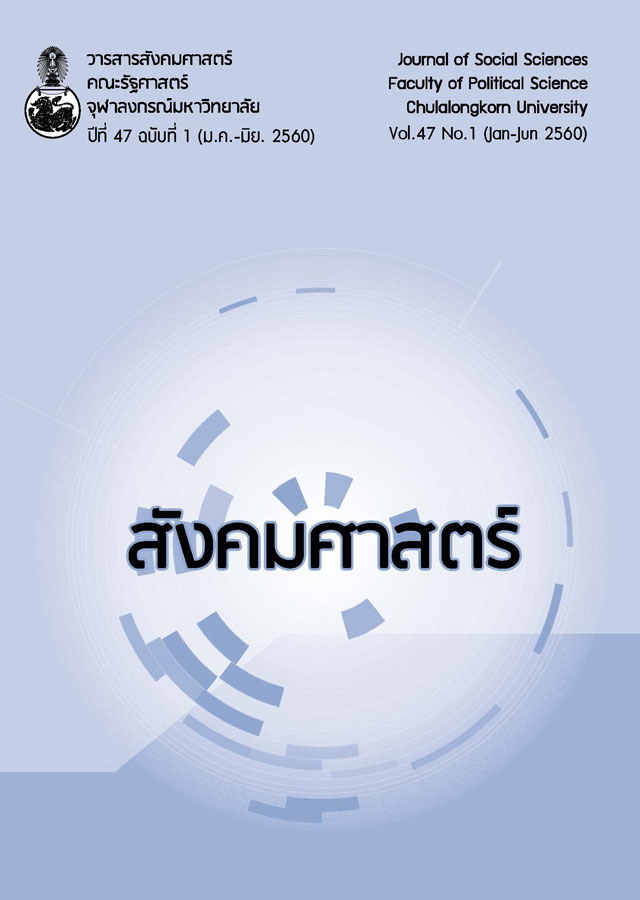The Southern Route of North Korean Migrants: Dynamics and Problems
DOI:
https://doi.org/10.61462/cujss.v47i1.780Keywords:
North Korean migrants, Southeast Asia, Mekong regionAbstract
Since the Cold war, Southeast Asia has been facing severe refugee problems from the Vietnam War, Laos and now Rohingya which become significant challenges for this region. Besides the refugee problems within the region, Southeast Asian countries especially those along the southern border of China – Vietnam, Laos, Myanmar and Thailand - have been challenged by North Korean migrants since the end of Cold War. The North Korean migrants travel more than 1,000 kilometers from China to South Korea by using this region as a transit point. These countries, however, have different practices about refugees and definitions concerning refugee status. To define North Korean defector as a “refugee” leads to many questions about how to manage this problem, by using international law or depending on the relationship between those countries with North Korea.
Downloads
References
Anuch Abhabirom.2015. Song-Kram Yen Nai Dan Som: Vikrit tee young maisinsud. [Cold war in Korea: An enduring crisis]. Bangkok: Matichon. (in Thai)
Cha, Victor. 2012. The Impossible State: North Korea, Past and Future. http://www.genocidewatch.org/images/North_ Korea_12_05_18_The_Impossible_State.pdf(Accessed on December 31, 2014).
Chang, Y., S. Haggard, and M. Noland. 2008. Migrations experiences of North Korean refugees: Survey evidence from China. https://piie.com/publications/wp/wp08-4.pdf (Accessed on December 31, 2014)
Chiang Rai is heaven destination for North Korean migrants. 2014. http://www.chiangraibulletin.com/2013/07/20/ chiang-rai-is-heaven-destination-for-north-korean-migrants/ (Accessed on September 17, 2014).
Harlan, Chico. 2013. For those fleeing NK new Problems on obscure escape route through Laos. http://www.washingtonpost.com/world/for-those-fleeing-north-korea-laos-poses-new-problems/2013/06/14/ff5aa790-d27f-11e2-a73e-826d299ff459_story.html (Accessed on November 20, 2014).
Human Rights Watch. 2014. Thailand: Refugee policies ad hoc and inadequate. http://www.hrw.org/node/110100 (Accessed on October 12, 2014).
International Crisis Group. 2006. Perilous journeys: The plight of North Koreans in China and beyond. Asia Report 122(October).
Kim, Soo-Am. 2008. Conception of democracy and human rights in DPRK. Seoul: Korea Institute for National Unification.
Kim, Sung Eun.2010. The Thai immigration’s discriminalization practices towards North Korea refugees. M.A.Thesis. Southeast Asian Studies, Chulalongkorn University.
Kurlantzick, Jashua. 2014. Laos returns NK refugee to the North” Council on Foreign Relations. http://blogs.cfr.org/asia/2013/06/17/laos-returns-north-korean-refugees-to-the-north/ (Accessed on November 30, 2014].
Lee, Hae Young. 2009. Lives for sale: Personal accounts of woman fleeing North Korea to China. Washington, DC: HRNK Publications- U.S. Committee for Human Right in North Korea.
Margesson, R., E. Chanlett-Avey, and A. Bruno. 2007. North Korean refugees in China and human rights issues: International response and U.S. policy options. CRS Report for Congress, September 26. Silp, Sai. 2014. North Korea refugees see North Thailand as entry point. http://www2.irrawaddy.org/article.php?art_id=7310 (Accessed on September 16, 2014).
Song, Jiyoung. 2013. Smuggling refugees: The social construction of North Korean migration. http://ink.library.smu.edu.sg/soss_research/1384 (Accessed on October 22, 2014].
-----. 2015. Twenty years’ evolution of North Korean migration, 1994–2014: a human security perspective. Asia & the Pacific Policy Studies 2(2): 399–415.
Suk, Lee. 2005. The DPRK famine of 1991-2000: Existence and impact. Seoul: Korea Institute for National Unification.
Tanaka, Hiroyuki. 2008. North Korean: Understanding migration to and from a closed country. http://www.migrationpolicy.org/article/north-korea-understanding-migration-and-closed-country (Accessed on January 19, 2015).
Young-Jin, Choi. 2011. Human Rights Infringement on North Korean Refugees, Migration Networks and Policy Implication in Asia. Journal of peace and unification studies3(1): 385-429.
Downloads
Published
How to Cite
Issue
Section
License
Copyright (c) 2017 Faculty of Political Science, Chulalongkorn University

This work is licensed under a Creative Commons Attribution-NonCommercial-NoDerivatives 4.0 International License.
Public Licensing Terms
Copyright and Licensing Policy
The Chulalongkorn University Journal of Social Science publishes all content under the Creative Commons Attribution-NonCommercial-NoDerivatives 4.0 International License (CC BY-NC-ND 4.0).
Copyright
All published articles in the Chulalongkorn University Journal of Social Science are the copyright of the Faculty of Political Science, Chulalongkorn University. Authors transfer all rights to the journal upon acceptance of their manuscript for publication.
CC BY-NC-ND 4.0 License
Under this license:
-
Attribution (BY): Users must give appropriate credit to the authors, the Faculty of Political Science, Chulalongkorn University, and the Chulalongkorn University Journal of Social Science, provide a link to the license, and indicate if changes were made. They may do so in any reasonable manner, but not in any way that suggests the licensor endorses them or their use.
-
NonCommercial (NC): Users may not use the material for commercial purposes. Commercial use requires prior written permission from both the authors and the Faculty of Political Science, Chulalongkorn University.
-
NoDerivatives (ND): If users remix, transform, or build upon the material, they may not distribute the modified material. Adaptations of the work require prior written permission from both the authors and the Faculty of Political Science, Chulalongkorn University.
Open Access Statement
The Chulalongkorn University Journal of Social Science provides immediate open access to its content on the principle that making research freely available to the public supports a greater global exchange of knowledge. Users are allowed to read, download, copy, distribute, print, search, or link to the full texts of the articles without asking prior permission from the publisher or the author, in accordance with the CC BY-NC-ND 4.0 license.
Self-Archiving Policy
Authors may archive the final published version, preprints, or postprints of their articles in institutional repositories or on their personal websites, provided that they acknowledge the original publication in the Chulalongkorn University Journal of Social Science with a complete citation and a link to the journal's website.
Permissions
For any use beyond those covered by the CC BY-NC-ND 4.0 license, please contact:
Editorial Office
Chulalongkorn University Journal of Social Science
Faculty of Political Science, Chulalongkorn University
Email: cusocscij@gmail.com
For more information about the Creative Commons Attribution-NonCommercial-NoDerivatives 4.0 International License, please visit: https://creativecommons.org/licenses/by-nc-nd/4.0/





